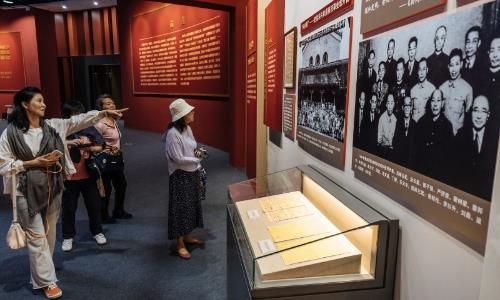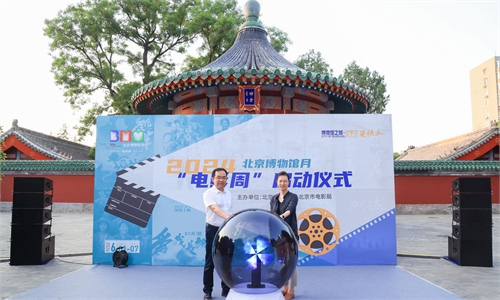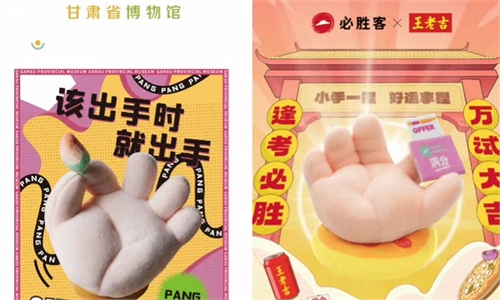Photos of hand-shaped stuffed toys Photo: Courtesy of the Paper on Sina Weibo
On May 27, food company Pizza Hut released its latest cultural creative product designed in collaboration with Chinese beverage brand Walovi. The product is a hand-shaped stuffed toy with its index finger and thumb pinching a file folder printed with the phrase "full points," from which a piece of paper that says "offer" sticks out. The design represents wishes of good luck on tests.
The product was offered through Pizza Hut's official WeChat account as part of a meal-deal promotional campaign.
However, soon after the item debuted, netizens noticed it bore an extreme similarity to a toy launched by the Gansu Provincial Museum in June 2023.
No matter if is the hand design, the color or even the similar "pinching luck" hook, these two cultural products look incredibly similar with the only difference being that the hand of the museum product is pinching a lotus bud.
According to the Gansu Provincial Museum, the toy design was inspired by a stone Buddhist statue in its collection. The statue was created in the Sui Dynasty (581-618) and was unearthed in Tianshui, Gansu Province.
Cultural and creative industry expert Yao Yu told the Global Times that the museum's toy design was "substantially modernized" from the original relic.
"We can clearly see that the toy is a creative derivation that incorporates a cultural narrative that is trending online," Yao noted. Pinching something, also known as "na nie" in Chinese, is a social media buzzword among young people in China that means one can complete a task effortlessly.
The Gansu Provincial Museum said in its notice that a letter has been sent to YumChina, Pizza Hut's owner in China, to demand the company put "an immediate end to the alleged infringement" as the two pieces are "highly similar in creative design and overall visual presentation."
In the notice, the museum also stated that it had previously registered the IP rights to the toy and that it reserves the right to take legal measures to protect its IPs.
Although Pizza Hut's design did raise concerns of infringement, law expert Huang Nu told the Global Times the incident's crux is when the museum registered the IP and whether or not the museum can provide solid evidence of "the entire creative process" to make the product.
The expert said that if the museum does hold the toy's copyright, it should show how the piece was developed and what qualities make it a novelty different from other creative products.
"We also need to investigate whether it was possible for one design to copy another, for example, if the museum's design was spread publicly before Pizza Hut's one, then this is an advantage for the museum," Huang emphasized.
This is not the first time the museum has been involved in an IP infringement dispute. The number of such disputes have been increasing along with the museum's growing fame.
In 2023, a series of events on safeguarding the cultural IPs of the Sanxingdui Museum were launched in Chengdu, Sichuan Province. During the events, the museum made it clear that the documentaries and creative dance performances created by the museum cannot be remixed or pirated.
"More national-level guidelines need to be established to support museums' IP management," Yao told the Global Times.



